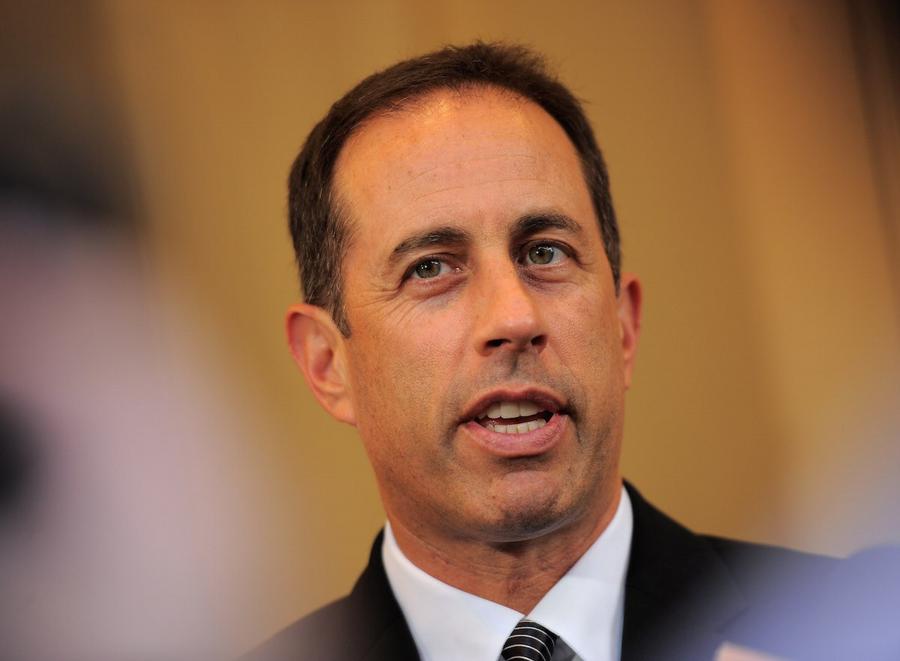"Seinfeld" was perhaps the last true television pop culture phenom to come out of the 20th century. To hear some people tell it, there was never a show like it before and there hasn't been one like it since. And unlike some other groundbreaking sitcoms I could name, "Seinfeld" is the rare example of a television gem that walked away before "jumping the shark," as they say.
On the other hand, had it been up to NBC executives, Jerry Seinfeld would have come back for one more, possibly shark-jumping season. A season that would have paid Jerry an absolutely enormous amount of money.
Jerry rejected that absolutely enormous offer.
In rejecting that offer, General Electric's CEO Jack Welch (GE was NBC's parent company)
"went numb."

Getty Images
"Unheard of" Offer
Jerry earned a total of $100,000 for the very first 5-episode season of his show. $20,000 per episode.
His pay jumped to $40,000 per episode for the second and third seasons.
For seasons 4, 5 and 6, Jerry earned $100,000 per episode.
He made the jump to a then-unprecedented $500,000 per episode for seasons 7 and 8.
For the ninth and final season, Jerry earned $1 million per episode. That worked out to $24 million for the season. The finale of that ninth season aired on May 14, 1998.
Not long after that episode aired, NBC executives – working under the direction of GE CEO Jack Welch – were ordered to get one more season out of Jerry. Whatever it took.
Whatever it took resulted in Jerry being offered $5 million per episode plus a guaranteed 22 episodes if he agreed to do a 10th season. FYI, $5 million * 22 episodes equals…
$110 million
It was such a massive offer, NBC execs were certain Seinfeld would accept. Here's one of those executives, Warren Littlefield, remember how it all went down:
"We didn't mess around. What we put on the table was unheard of. We went in there with a staggering sum and there was tremendous confidence that no one could walk away from it… (Seinfeld) came to me and said, 'I don't have a life, I'm not married, I don't have kids.' We gave it everything we had, he was tempted, but in the end it was a quality of life decision."
Another executive described Jack Welch's reaction to the rejection:
"When Jerry said he was turning it down, Jack just went numb."
Unlike his fictional counterpart, it seems like Jerry Seinfeld was truly just ready to settle down, and not even $110 million was enough to change his mind.
Now, keep in mind both Jerry and Larry David owned 7.5% of the show's back-end equity. Those points have translated into hundreds of millions of dollars over the decades as "Seinfeld" has generated billion in syndication royalty fees. As of this writing, both Jerry and Larry have earned $800 million from syndication sales. Hence, Jerry Seinfeld's net worth of $950 million today. Larry David's net worth is $400 million, because he lost several hundred million dollars in his divorce from wife Cheryl David.
/2019/09/GettyImages-470192503.jpg)
/2009/09/Jerry-Seinfeld-1.jpg)
/2014/10/GettyImages-76541601.jpg)
/2022/02/seinfeld.jpg)
/2016/01/GettyImages-470192503-e1509855481444.jpg)
/2017/09/GettyImages-488489943.jpg)
/2022/01/Jane-Birkin.jpg)
/2021/02/barry-sanders.jpg)
/2019/10/Paulina-Porizkova.jpg)
:strip_exif()/2020/06/taylor.png)
/2021/03/ben.jpg)
/2009/10/Peyton-Manning-1.jpg)
/2012/07/GettyImages-508683722.jpg)
/2012/09/Delta-Goodrem.jpg)
/2010/02/Jennifer-Hudson.jpg)
/2020/01/akon2-1.jpg)
/2020/01/Patrick-Duffy.jpg)
/2012/08/Archie-Manning.jpg)
/2010/12/fm.jpg)
/2019/12/jd.jpg)
/2015/09/Eli-Manning.jpg)
/2019/12/Amanda-Anisimova.jpg)
/2017/06/Lauralee-Bell-1.jpg)